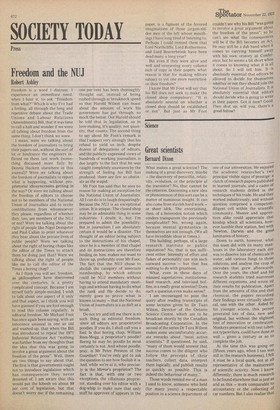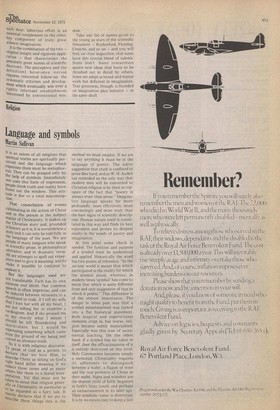Science
Great scientists
Bernard Dixon
What makes a great scientist? The making of a great discovery, maybe — the discovery of penicillin, relativity, evolution, or the principle of the transistor? No, that cannot be the criterion. Discerning a new idea or phenomenon of this sort can be a matter of numinous insight. It can also come from slavish hard work — or sheer kick. The entertaining, then, of a ,heterodox notion which renders transparent the previously inexplicable? No, wrong again, because mental gymnastics in themselves are not enough. (We all have incredible ideas at times.) The building, perhaps, of a large research institute or public reputation? No, that is not sufficient either. Intensity of effort and flukes of personality can win such outward success — but that has nothing to do with greatness.
What, even in these days of misused superlatives, institutionalised research, and televised boffins, is a really great scientist? Does such a question even make sense?
I am encouraged to pose the query after reading transcripts of some lectures given by Dr Tuzo Wilson, Director of the Ontario Science Centre, which are to be broadcast shortly by the Canadian Broadcasting Corporation. In the second of the series Dr Tuzo Wilson makes some uncomfortably accurate remarks about "most active scientists." If questioned, he said, "many of them would answer that success comes to the diligent who follow the precepts of their teachers, collect data, interpret them logically, and publish results as quickly as possible. This is indeed the behaviour of many."
Those words remind me of a man I used to know, someone who held (for many years) a respectable position in a science department of
one of our universities. He enjoyed the academic researcher's two principal visible signs of prestige: a clutch of research papers published in learned journals, and a cadre of research students drilled in the techniques of his trade. He and they worked industriously, and without question comprised a competent, diligent cell within the scientific community. Master and apprentices alike could appreciate that kinship which all scientists, however humble their station, feel with Newton, Darwin and the great luminaries of history.
Down to earth, however, what this team did with its many manhours in the laboratory each day was to dissolve lots of chemicals in water, add various fungi to those solutions, and analyse the crop of microbes that grew afterwards. Over the years, the chief and his research studebts tried numerous different organisms, and wrote UP their results for publication. Apart from the amounts of this and that chemical, the papers recording their findings were virtually identical, one with the other. Aided by his younger scions, this person generated lots of data, new and original, but without the slightest hint of innovation or cerebration. Monkeys presented with test tubes, not typewriters, could have done as well — given a century or so to complete the job.
At the time this was going on (fifteen years ago, when I too was still in the research business), I felt it must be a local quirk, not at all representative of the mainstream of scientific activity. Now I know differently; there is much research to be found elsewhere that is just as arid as this — work comparable to accountancy or the collecting of car numbers. But I also realise that such dour, laborious effort is an essential complement to the other, key component of truly great science: imagination.
It is the combination of the two — original insight and rigorous application — that characterises the genuinely great names of scientific discovery. The perceptive and (by definition) heterodox notion requires concerted follow-up, the systematic criticism and development which eventually win over a rightly reluctant establishment buttressed by conventional wis
dom.
Take any list of names given to the young as stars of the scientific firmament — Rutherford, Fleming, Einstein, and so on — and you will find, on close inspection, that some have this crucial blend of talents. Some don't. Some researchers spawn new ideas that have to be thrashed out in detail by others. Some are adept at bread-and-butter work but deficient in imagination. True greatness, though, is founded on imagination plus industry — in the same skull.

































 Previous page
Previous page